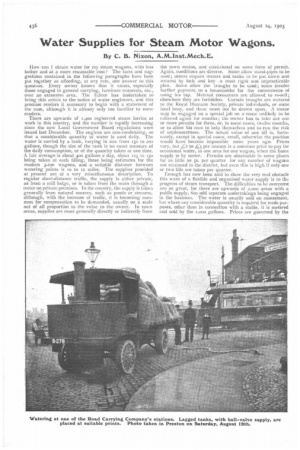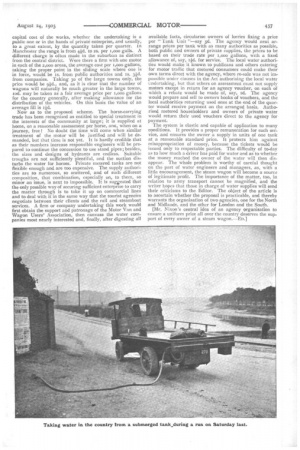Water Supplies for Steam Motor Wagons.
Page 8

Page 9

If you've noticed an error in this article please click here to report it so we can fix it.
By C. B. Nixon, A.M.Inst.Mech.E.
How can I. obtain water for my steam wagons, with less bother and at a more reasonable cost? The facts and suggestions contained in the following paragraphs have been put together as affording, at any rate, one answer to this question. Every owner knows that it exists, especially those engaged in general carrying, furniture removals, etc., over an extensive area. The Editor has Undertaken to bring thi.s article to the notice of water engineers, and this promise renders it necessary to begin with a statement of the case, although it is already only too familiar to some readers.
There are upwards of 1,400 registered steam lorries at work in this country, and the number is rapidly increasing since the new Local Government Board regulations were issued last December. The engines are non-condensing, so that a considerable quantity 'of water is used daily. The water is carried by a tank, varying in size from iv to zoo gallons, though the size of the tank is no exact measure of the daily consumption, or of the quantity taken at one time. A fair average is about 400 gallons a day, about 125 to 150 being taken at each filling, these being estimates for the modern 5-ton wagons, and a suitable distance between watering points is to to 12 miles, The supplies provided at present are of a very miscellaneous desoription. To regular short-distance traffic, the supply is either private, as from a mill lodge, or is taken from the main through a meter on private premises. In the country, the supply is taken generally from natural sources, such as ponds or streams, although, with the increase of traffic, it is becoming common for compensation to be demanded, usually on a scale out of all proportion to the value to the owner. In town areas, supplies are most generally directly or indirectly from the town mains, and condaionaI on some form of permit. Again, conditions are diverse. Some allow stand-pipes to be used; oiners require meters and tanks to be put down and secured by lock and key —a most rigid and impracticable plan. Some allow the troughs to be used; some involve further payment to a householder for the convenience of using his tap, Metered consumers are allowed to re-sell; elsewhere they are forbidden. Certain troughs are metered to the Royal Humane Society, private individuals, or some local body, and .L11E:se must not be drawn upon. A motor may be engaged on a special job on a route unlikely to be followed again for months the owner has to take out one or more permits for three, or, in some cases; twelve months, or to allow his men to help themselves and to run the risk of unpleasantness. The actual value of one fill is, fortunately, except in special eases, small, otherwise the position would have become impossible some years ago. Prices vary, but La to £3 per annum is a common price to pay for occasional water, in one area for one wagon., when the home supply is by meter. Permits are obtainable in some places for as little as 5s. per quarter for any number of wagons not stationed in the district, but even this is high if only one or two fills are taken per quarter. Enough has now been said to show the very real obstacle this want of a flexible and organised water supply is to the progress of steam transport. The difficulties to be overcome are as great, for there are upwards of 2,000 areas with a public supply, hoo odd separate undertakings being engaged in the business. The water is usually sold on assessment, but where any considerable quantity is required for trade purposes, other than in connection with a stable, it is metered and sold by the I.001) gallons. Prices are governed by the capital cost of the wolks, whether the undertaking is a public one or in the hands of private enterprise, and usually, to a great extent, by the quantity taken per quarter. In Manchester the range is from 4id. to 2S. per ',ow galls. A different charge is often made in the suburban as distinct from the central district. Were there a firm with one motor in each of the 2,000 areas, the average cost per 1,000 gallons, taking the proper point in the sliding scale where one is in force, would be is. from public authorities and is. 3id. from companies. Taking 30 of the large towns only, the price would be eid., and, as it is clear that the number of wagons will naturally be much greater in the large towns, sod. may be taken as a fair average price per ',coo gallons for the country generally, after making allowance for the distribution of the vehicles. On this basis the value of an average fill is lid. Now as to the proposed scheme. The horse-carrying trade has been recognised as entitled to special treatment in the interests of the community at large; it is supplied at home, on a reasonable assessment per horse, ante when on a journey, free ! No doubt the time will come when similar treatment of the motor will be justified and will be demanded, but that time is not yet. It is hardly credible that as their numbers increase responsible engineers will be prepared to continue the concession to use stand pipes; besides, the sizes and designs of hydrants are endless. Suitable troughs are not sufficiently plentiful, and the suction disturbs the water for horses. Private metered tanks are not flexible enough and are too expensive. The supply authorities are so numerous, so scattered, and of such different composition, that combination, especially on, to them, so minor an issue, is next to impossible. It is suggested that the only possible way of securing sufficient enterpnse to carry the matter through is to take it up on commercial lines and to deal with it in the same way that the tourist agencies negotiate between their clients and the rail and steamboat services. A firm or company undertaking this work would first obtain the support and patronage of the Motor Van and Wagon Users' Association, then canvass the water companies most nearly interested and, finally, after digesting all available facts, circularise owners of lorries fixing a price per "Tank Unit "—say scl. The agency would next arrange prices per tank with as many authorities as possible, both public and owners of private supplies, the prices to be based on their trade rate per i,000 gallons, with a tixeci allowance of, say, 'id. for service. The local water authorities would make it known to publicans and others catering for motor traffic that metered consumers could make their own terms direct with the agency, where re-sale was not impossible under clauses in the Act authorising the local water undertaking, but that others on assessment must not supply motors except in return for an agency voucher, on each of which a rebate would be made of, say, Id. The agency would prepare and sell to owners books of vouchers, and the local authorities returning used ones at the end of the quarter would receive payment on the arranged basis. Authorised metered householders and owners of private water would return their used vouchers direct to the agency for payment.
The system is elastic and capable of application to many conditions. It provides a proper remuneration for each service, and ensures the owner a supply in units of one tank at a reasonable standard price. It protects him against misappropriation of money, because the tickets would be issued only to respectable parties. The difficulty of to-day as to how much a driver has paid for water and as to whether the money reached the owner of the water will then disappear. The whole problem is worthy of careful thought on the part of water engineers and managers, as, with a little encouragement, the steam wagon will become a source of legitiinate profit. The importance of the matter, too, in relation to army transport cannot be magnified, and the writer hopes that those in charge of water supplies will send their criticisms to the Editor. The object of the article is to ascertain whether the proposal is practicable, and thereby warrants the organisation of two agencies, one for the North and Midlands, and the other for London and the South.
[Mr. Nixon's central idea of an agency organisation to ensure a uniform price all over the country deserves the support of every owner of a steam wagon.—En.]
















